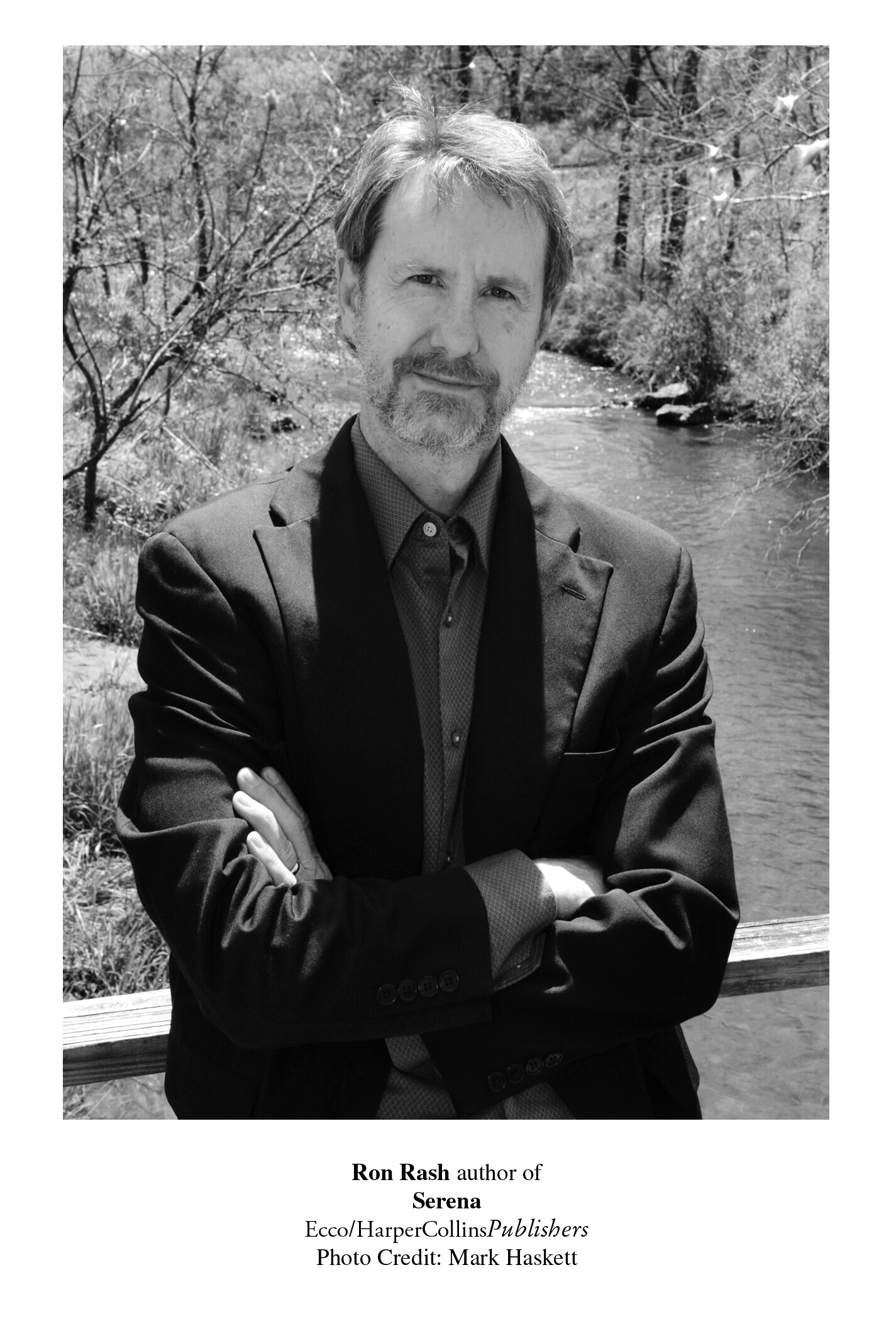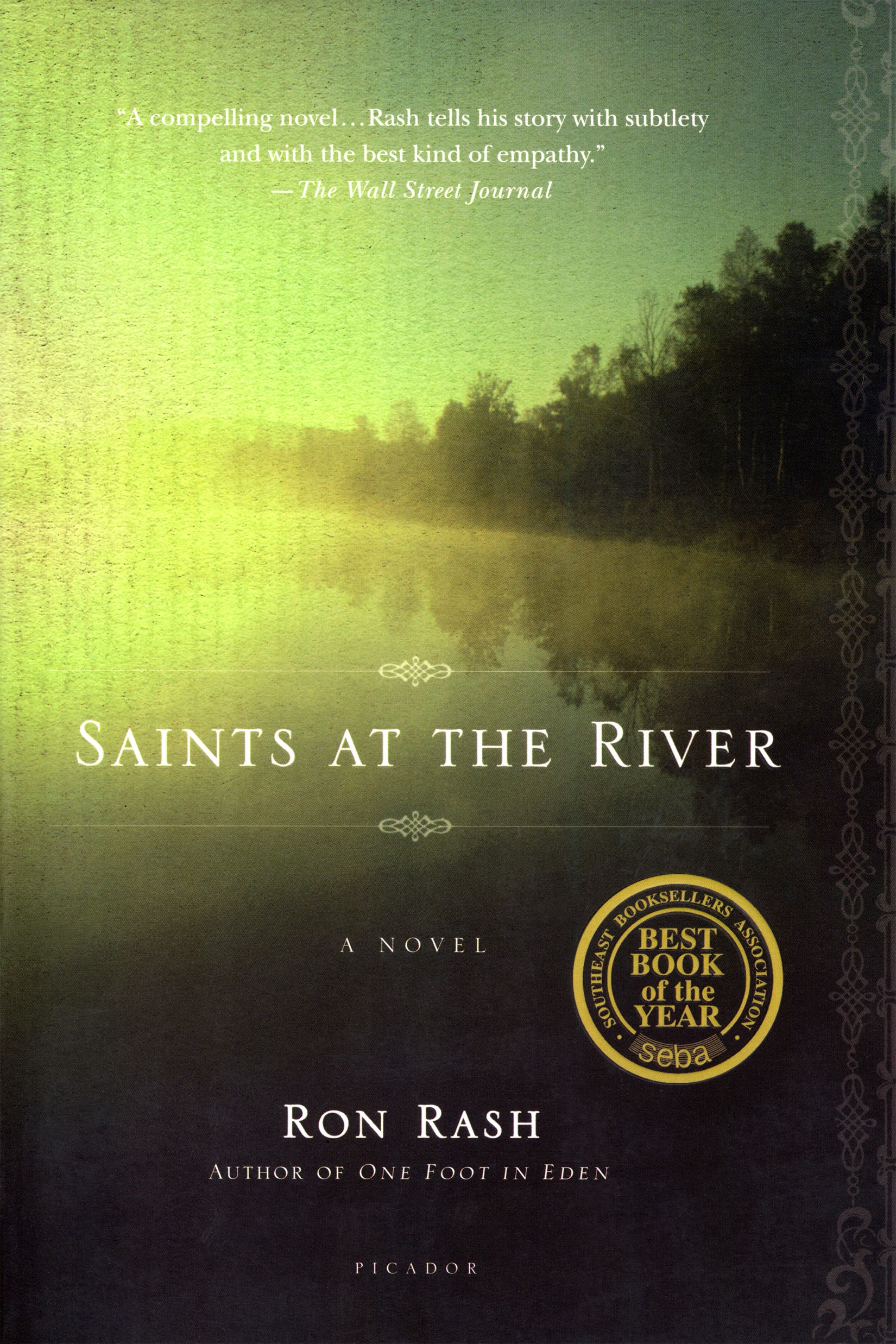
Ron Rash – The Great Joy of Reading Southern Writing
reprinted from Jasper #003
By Cynthia Boiter
Ron Rash speaks the way he writes, with a voice that is rich with history, low and close to the earth, reflecting the humble wisdom that comes from learning from the past and listening to the lessons of nature and the stories of one’s ancestors. A father, teacher, husband, poet, Rash is, above all, a gifted wordsmith who wraps his words around his readers with tender precision.
Born in Chester, South Carolina, Rash’s people, as Southerners say, are from the North Carolina mountains, and much of his childhood was spent visiting relatives who lived in the shadows of the Appalachians. The author of a baker’s dozen of books – four novels, with one forthcoming in April, four short story collections, and five books of poetry - Rash hasn’t always written, though he seems to do so with such ease. “I didn’t write as a child,” he says, “though I loved to read and I loved nature. I was very comfortable out in the woods. I loved to daydream. Really, I was pretty introverted.”
Rash didn’t begin writing until he was an English major at Gardner-Webb University in Boiling Springs, North Carolina. “It wasn’t something I really enjoyed,” the 2011 inductee into the Fellowship of Southern Writers says. “But when I started working on my master’s degree at Clemson, I got into the work of Walker Percy, and that really influenced me. I found myself reading and writing all the time.” Percy, who died in 1990, was a physician-novelist and non-fiction writer; the author of The Moviegoer, The Last Gentleman, Love in the Ruins, and others, Percy was one of the founders in 1987 of the Fellowship of Southern Writers, and known for his existentialist literary struggles, as well as for coming late, though very successfully, to writing himself.
It was the reading of Fyodor Dostoyevsky’s Crime and Punishment that “made me want to be a writer,” Rash says. Early in the novel, an unscrupulous pawnbroker is killed by a poor ex-student who plans to use the pawnbroker’s money to do good deeds. “It was almost like this book entered me,” Rash reveals. “I’ve read and re-read it several times – I still almost revere Dostoyevsky as a writer.”
An early and multiple winner of the South Carolina Fiction Project, previously sponsored by The State newspaper and then by the Charleston Post and Courier, Rash began his writing career as a poet and short story writer. His first publications were The Night the New Jesus Fell to Earth and Other Stories from Cliffside, North Carolina, a book of short stories published in 1994, and Eureka Mill, a book of poetry published in 1998. In 1994, Rash won a National Endowment for the Arts fellowship in poetry, and in 1996, the Sherwood Anderson Prize for emerging fiction writers.
“A short story is much closer to a poem than a novel,” Rash says, explaining that he much prefers short story writing and poetry to writing novels. “It is just so much more concise.”
In 2000, he published a trio of poetry and prose books, Among the Believers, Raising the Dead and Casualties, before finally, in 2002, publishing his first novel, One Foot in Eden, winner of Forward Magazine’s Gold Award for the Best Literary Fiction, the Novello Literary Award, and the Appalachian Book of the Year, all for 2002.
But Rash, who is now the Parris Distinguished Professor of Appalachian Cultural Studies at Western Carolina University didn’t plan to write the novel.
“I was in my early forties and I was writing what I thought would be a short story, but it just wouldn’t end. And I got this sinking feeling,” he laughs, explaining how the novel just grew before him almost of its own accord. “With a novel, you have to have a mill-like diligence to get it done. It is much more exhausting. And it takes me about three years to put a novel together.”
Rash followed One Foot in Eden, a murder mystery heavily shrouded in place and culture, with the novels Saints at the River in 2004, The World Made Straight in 2006, and Serena in 2008.
Set in 1929 in the virginal mountains of North Carolina, Serena is the gripping story of a newly married couple who commit themselves to building a fortune in the timber industry. The book won a multitude of awards and accolades including the Southern Independent Booksellers Alliance Book of the Year Award and being named Publishers Weekly Best Book of 2008, as well as one of The New York Times’ Ten Favorite Books, the Washington Post’s World’s Best Fiction, number seven in Amazon’s Top 100 Best Books of 2008, and it was a finalist for the Pen/Faulkner Award in 2009. Of particular note is how the novel successfully portrays an ambitious and greedy entrepreneur who just happens to be a woman – rather than falling into the all too often tripped trap of portraying a ne’er do well who never does well precisely because she is a woman.
Rash is proud of his work on Serena though he admits the writing of it was an exhausting endeavor. “I feel like Serena is my best book, and the best I’ll ever write,” he says. “But Serena probably took more out of me than any other book. I had days and weeks when it was just flowing. But it wore me out.”
Rash’s third novel, The World Made Straight, published two years prior to Serena, won the Sir Walter Raleigh Fiction Award in 2006, as well as the Atlantic Monthly’s 2006 Summer Reading pick, and the 2007 American Library Association Alex Award, and addressed similar themes of environment, history and family – all within the context of a classic Southern connection to the earth and nature.
Also exploring issues of frailty as exhibited by relationships, the environment, and ultimately, life itself, 2004’s Saints at the River was chosen as the 2012 selection for the One Book, One Columbia campaign – a community reading program in which the entire city of Columbia and its surroundings are encouraged to read and discuss the same book over the designated period of January 17 through the end of February, 2012. Saints at the River is set in South Carolina with a significant portion of the action taking place in Columbia, and the two main characters being Columbia residents. The novel begins with the death of a 12-year-old girl who drowns in the fictional Tamassee River in upstate South Carolina and whose body becomes trapped below the river. The conflict of the story centers around the best way of removing her body, and locals, environmentalists, and a land owner with an eye toward development all disagree.
“I wanted to write a novel about environmental issues that didn’t come off as propaganda,” Rash says. “A lot of time environmentalists make the mistake of not seeing the other point of view. I hope Saints at the River will allow people to say that it is a fair book. Progress is not a black or white situation and the problem in this story isn’t either. There are no bad guys, and sympathies shift throughout the book.”
The connection to the environment that Rash tends to feature in all of his novels comes naturally. “I spent so much of my childhood and adolescence on my grandmother’s farm near Boone, North Carolina, and I loved hunting and fishing but also being nomadic – just wandering through the woods,” he says. “There was no TV, no car or truck. I was there helping her on the farm – milking cows and such. She would fix me a good breakfast in the morning – and I would be gone for eight or nine hours, just wandering or fishing. We had relatives all around that area, and occasionally I’d see an aunt or uncle. … But, looking back on it now, it was all sort of amazing and wonderful. I got to hear that mountain dialect, and that’s what I hear in my head now when I write.”

Family, too, both dysfunctional and not, almost always plays a role in Rash’s stories, and Saints at the River is no exception. “It’s universal,” he says. “There’s always tension between love and loyalties and conflict.” One example, he notes, is the relationship between the protagonist of the novel, photographer Maggie Glenn, and her father, a prototypical Southern man. Rash describes Maggie as “a little self-righteous” but recognizes the difficulties she has communicating with her father and the role that heritage plays in that relationship. “There’s that Scots-Irish mentality cropping up in Maggie’s inability to communicate with her father,” he says. “It is very hard to get that generation of men to express their feelings.”
Not a fan of generalizations, Rash says he hopes his writing helps to “explode some of the stereotypes” that plague Southern literature. That said, most of the writers who have inspired Rash are Southern. Despite the stereotypes that arose from the film treatment of Deliverance, for example, he still lists South Carolina’s James Dickey high on his list of personally influential writers. “He taught me a lot,” Rash says of Dickey. “He showed me the possibility of writing about the South and also being universal.” Rash also highly regards the work of William Faulkner and Flannery O’Connor and can see their influence in his own work. “Reading Flannery and Faulkner has always been important to me because they showed the rural Southern world that I’m interested in,” he says.
No stranger to honors and awards – Saints at the River was given the Weatherford Award for Best Novel of 2004, and was named Fiction Book of the Year by the Southern Critics Book Circle as well as the Southeastern Booksellers Association – Rash wears a kind of uncomfortable humility when asked about all the accolades he has accrued in a still relatively young writing career. “I’m probably most proud of the Frank O’Connor Award,” he admits, which he received in 2010 for his collection, Burning Bright, also published in 2010. The Frank O’Connor Short Story Award is the largest short story prize in the world.
Despite his fairly universal success in all three genres of short and longer fiction as well as poetry, Rash appears to be most comfortable with short fiction which, he admits, also employs some degree of poetry. Commenting on his new novel, The Cove, due for released in April 2012, Rash lets out a long breath and admits that he doesn’t think he’ll ever write another novel again. “The last one, I believe, is good,” he says, “but there was little joy in the writing.”
Luckily, there is great joy in the reading of Rash’s works, whether short fiction, novels, or poetry. And happily, Columbia-area book lovers will be able to make that great joy their own by joining one another in 2012’s One Book, One Columbia program as we read Ron Rash’s Saints at the River.
~~~~~~~~~~~~~~
Jasper Magazine announces the
Jasper Magazine One Book, One Poem Competition
Ron Rash, author of this year's One Book, One Columbia selection, Saints at the River, has agreed to serve as adjudicator for the Jasper Magazine One Book, One Poem Competition.
Poets from the Greater Columbia Arts Community are invited to submit poetry inspired by the reading of Saints at the River. Author Ron Rash's selection of the winning poem will be published in a future issue of Jasper Magazine - the Word on Columbia Arts, and its author will receive a literary arts prize package.
Finalists, adjudicated by Jasper Magazine literary arts editor, Dr. Ed Madden, will be published in the Jasper Magazine blog - What Jasper Said. (www.jaspercolumbia.net/blog). The deadline is March 31, 2012.
Fine Print: Please submit (in triplicate) poems inspired by the reading of Saints at the River by Ron Rash to -
Jasper Magazine One Book, One Poem Competition
Muddy Ford Press
1009 Muddy Ford Road
Chapin, SC 29036.
Please include a cover sheet including your name, address, phone number, email address, and the title or first line of each poem.
Your name should appear nowhere else on your submissions.
Entry fee = $5 per each three poems submitted (make checks payable to Muddy Ford Press).
Deadline = March 31, 2012.
For more information contact - editor@jaspercolumbia.com.










